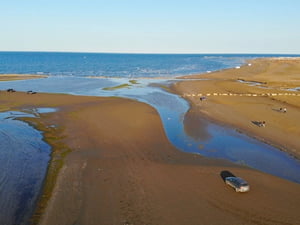The withdrawal of water in the Caspian Sea, known as the “sea of energy”, is being followed with concern as it may affect transit maritime transport in Azerbaijan.
As a result of climate changes, global warming and increasing temperatures every year, the water level in seas and lakes is decreasing. Water basins that do not have access to oceans, such as the Caspian Sea, are more affected by this situation. The water levels of these types of basins are determined by the balance between flowing rivers, rainwater and evaporation from the water surface.
It can now be seen that the water in the Caspian Sea in Azerbaijan has receded in recent years. It is stated that this situation in the Caspian may affect the ecological balance as well as the transit maritime transport, which has been increasing recently. It is stated that as the water recedes, it may become difficult to approach ports, and serious problems may occur in the passage of ships as underwater rocks become exposed.
With the agreement of the Caspian Sea coastal countries Russia, Iran, Kazakhstan, Turkmenistan and Azerbaijan, the sharing problem has been largely eliminated recently. Now, the intense withdrawal in the waters of the Caspian Sea, known as the “sea of energy”, is causing concern.
Climate change is the main factor in the withdrawal of water in the Caspian Sea
Experts agree that all riparian countries must find a solution together to prevent the Caspian Sea from experiencing the same outcome as the Aral Sea.
Rasim Settarzade, Undersecretary of the Ministry of Ecology and Natural Resources of Azerbaijan, stated that the water of the Caspian Sea rises in certain periods and recedes in certain periods.
Settarzade reported that the lowest water level of the 20th century in the Caspian Sea was experienced in 1977, and a 29-meter drop in ocean level was recorded during this period.
Stating that the water in the Caspian increased by 2.5 meters between 1977 and 1995, Settarzade said, “Since 1995, there has been a decrease in the water of the Caspian. After 2005, the decrease became regular. Now, it has not yet reached the level of 1977, but the decrease continues.” .” shared his knowledge.
Settarzade stated that the main factor in the withdrawal of the Caspian Sea’s water is climate change.
Settarzade pointed out that the withdrawal of the Caspian Sea’s water is visible in all the coastal countries and that some islets have formed on the coasts, and continued as follows:
“We must adapt all our activities related to the Caspian to this situation. Scientists around the world have different scenarios. Some suggest that the water in the Caspian will increase, some suggest that it will decrease. We must be prepared for the worst. With the initiative of Azerbaijan, a study consisting of experts from riparian countries “A group has been established. This working group will meet next month. We must share our scientific research with each other and prepare for all kinds of scenarios together. If we do not want to encounter bad scenarios, we must act together and produce solutions together.”
Settarzade said, “If the decrease continues, this will also prevent large ships from docking at the ports. We need to analyze this issue well and take precautions.” he said.
“Anthropogenic factors also played a big role in the withdrawals.”
Assoc. Prof. Head of Ecological Geography Department of the Institute of Geography of the Ministry of Science and Education of Azerbaijan. Dr. Enver Aliyev stated that the Caspian Sea is the largest water basin in the world that is not connected to the ocean.
Aliyev said that it is known that the Caspian Sea was formed approximately 220 million years ago in the Mesozoic period, and that during this period, the water increased and receded from time to time.
Noting that it is known that the Maiden Castle, one of the historical symbols of Baku, was once located in the Caspian Sea, Aliyev said, “Anthropogenic factors also play a major role in the recent withdrawals. 85 percent of the water supply of the Caspian is met by the Volga River. On the Volga “The constructed dams and the use of water in agriculture cause the Caspian’s water to decrease.” said.
Aliyev stated that he was not very pessimistic about the withdrawal of the Caspian water and said the following:
“Climate scientists predict that the rate of rain in the region will increase. If this happens, the water level of the Caspian will return to its previous state, but human beings should be very careful here. Nature does not make mistakes, humans make mistakes. Just as the withdrawal of water from the Caspian may have harms, the increase in its water level also has harms. “Scientists of riparian countries should solve all possible issues with common sense, but they should do this very carefully and without haste. Any intervention in a geographical formation with a history of millions of years without knowing its history may have bad consequences.”
The opinions expressed herein are the author’s and not necessarily those of News2Sea.
#concern #Azerbaijan #withdrawal #Caspian #water #affect #maritime #transportation
